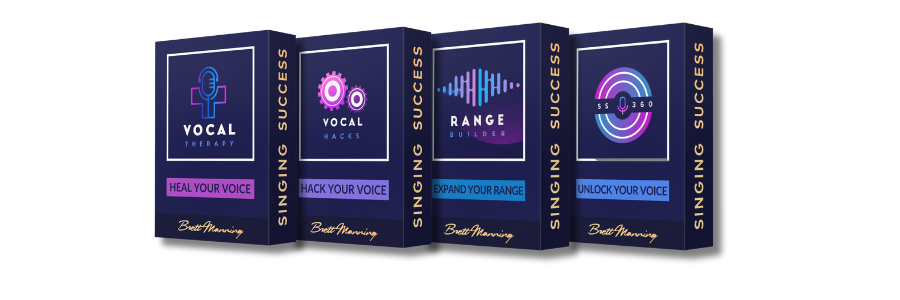
Fast-Track Your Success!!

VIP Membership includes:
- Exclusive Facebook Group
- Interact with our vocal coaches–ask them YOUR question
- Live warmups
- Masterclasses and Q&As with Brett Manning and his guests
- SS360 QuickStart Program
- SS360 – The FULL Systematic Vocal Course
- Vocal Hacks
- Range Builder
- Mastering Mix
- Mastering Harmony
- Mastering Vibrato
- Vocal Therapy
- Plus…exclusive content only found here all along the way!
You can struggle on your own, or you can get direct access to the Nashville Coaches who have launched some of the biggest names in the music industry.
On this episode, Brett and Dustin talk about building and maintaining relationships in the music industry, pretending to be an extrovert, and making your critics your peers….
Hey y’all! I’m Brett Manning and I’m Dustin Small, and you are listening to the Singing Success Show podcast.
Today, we’re talking about relationships and feelings. We recorded this episode post-lockdown, and we’re excited to hang out. We discuss the importance of building the right relationships in the music industry, rather than just trying to get in the door. Building relationships should be symbiotic, where both parties bring something to the table. We also talk about the value of humor in building connections and how to navigate different personality types.
We share personal experiences of investing in relationships and the potential for feeling used or let down. It’s crucial to have an exit strategy and discern the right situations for growth. Additionally, we touch on the importance of being worthy of the opportunities you receive and continuously improving as a musician. Finally, we mention the joy of reaching a point where performing feels natural and comfortable, like sitting in your favorite recliner. We share our recent experience of collaborating with others and the value of confidence and swagger in attracting working opportunities.
So, back to the point about building relationships in the music industry. It’s not just about networking or trying to get something from someone. It’s about establishing genuine connections, understanding and caring for the people you interact with. Building the right relationships means finding symbiotic connections where both parties bring something valuable to the table.
Sometimes, you may invest in someone or a project, only to feel used or taken advantage of in the end. Unfortunately, that’s a common occurrence in this industry. But it doesn’t mean you should stop building relationships. It’s about discerning the right situations and people to partner with, those who align with your values and goals.
However, it’s crucial to have an exit strategy in case a relationship or project goes south. It’s not always possible to foresee how things will turn out, but being prepared and maintaining your reputation are important. And having a plan B, C, or even D can provide some security in an unpredictable industry.
But here’s the thing, if you truly have a passion for music, you don’t approach it as just giving it a try. It becomes a part of who you are. You strive to be worthy of that moniker, to grow and evolve as an artist. It’s about being dedicated to your craft, perfecting your skills, and constantly pushing yourself to improve.
Being able to zoom in and zoom out musically, knowing when to be comfortable and confident, and when to challenge yourself, is crucial. It’s about finding that balance between relaxation and pushing your boundaries. When you reach that level of confidence and enjoyment in your performance, others will be drawn to work with you.
Ultimately, building relationships in the music industry is about authenticity, genuine connections, and bringing value to others’ lives. It’s about investing in people, not just for personal gain, but for the joy of collaboration and mutual growth. And while there may be challenges and disappointments along the way, the right relationships can lead to incredible opportunities and success.
In addition to building relationships, it’s crucial to take advantage of the various platforms and opportunities available in today’s digital age. With the rise of social media and streaming platforms, artists have more direct access to their audience than ever before. Utilize these tools to connect with fans, share your music, and build a following.
Engage with your audience by responding to comments, messages, and mentions. Show genuine interest in their support and feedback. Collaborate with other artists and producers to expand your reach and tap into different fan bases. Participate in online communities, forums, and music groups to network with like-minded individuals and potential collaborators.
Another essential aspect of building a successful music career is honing your live performance skills. The stage is where you can truly connect with your audience on a personal level. Put on captivating shows, focus on creating an immersive experience, and leave a lasting impression. This can help you build a dedicated fan base and generate word-of-mouth buzz.
Moreover, don’t underestimate the power of continuous learning and self-improvement. Stay up to date with industry trends, explore new genres and styles, and invest time in developing your craft. Take advantage of workshops, music courses, and mentorship programs that can provide valuable insights and guidance.
Lastly, perseverance is key. The music industry can be challenging and competitive, but don’t let setbacks discourage you. Stay focused, keep creating, and never stop believing in yourself and your talent. Success in music often requires resilience and determination, so keep pushing forward even when faced with obstacles.
Remember, building a successful music career is a journey that takes time and effort. It’s a combination of building relationships, leveraging digital platforms, honing your live performance skills, continuous learning, and perseverance. By approaching your music career with passion, authenticity, and dedication, you increase your chances of achieving your goals and making a meaningful impact in the industry.
As you continue to progress in your music career, it’s important to explore various avenues for exposure and promotion. Consider submitting your music to online music blogs, magazines, and playlists that cater to your genre. Getting featured on reputable platforms can significantly increase your visibility and attract new listeners.
Additionally, consider releasing your music on digital music platforms such as Spotify, Apple Music, and SoundCloud. These platforms offer global reach and can help you reach a wider audience. Utilize their promotional tools and algorithms to increase your chances of being discovered by new fans.
Collaborations can also play a significant role in expanding your reach. Partnering with other artists, whether it’s for a single, EP, or full-length album, can introduce your music to their existing fan base and vice versa. Look for artists whose style complements yours or whose audience aligns with yours to maximize the impact of the collaboration.
Networking within the music industry is crucial as well. Attend music conferences, festivals, and industry events to connect with industry professionals, fellow musicians, and potential collaborators. Building a strong network can open doors to new opportunities, such as getting signed to a record label, securing sync licensing deals, or landing performance opportunities.
As your music career progresses, it’s important to consider the business side of the industry. Educate yourself about music contracts, copyright laws, and royalties to protect your intellectual property and ensure you receive fair compensation for your work. Consider working with a music manager or entertainment lawyer who can guide you through these aspects and help you make informed decisions.
Lastly, always stay true to your artistic vision and maintain your authenticity. While it’s important to be adaptable and open to feedback, don’t compromise your artistic integrity solely for commercial success. Fans appreciate artists who stay true to themselves and create music that resonates with their unique style and message.
Building a successful music career requires a combination of talent, hard work, networking, promotion, and business acumen. Stay dedicated, continue to create, and adapt to the ever-changing landscape of the music industry. With perseverance and a passion for your craft, you can increase your chances of achieving long-term success and making a lasting impact with your music.

